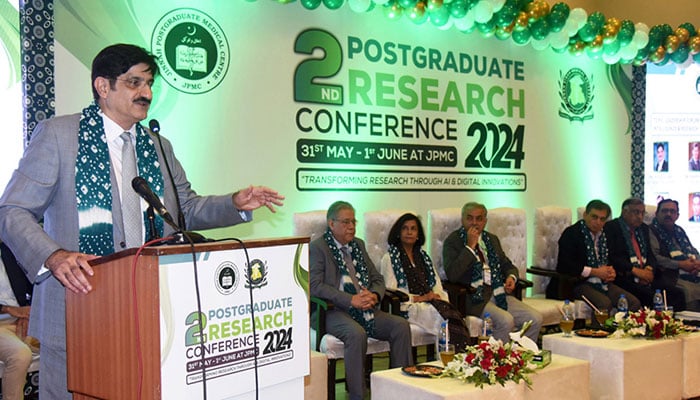JPMC to have AI system used at John Hopkins, Harvard Medical School hospitals: CM
In 2023-24, the JPMC had a budget of Rs11,000 million, NICH Rs2,066 million, and NICVD Rs15,674 million, totalling Rs25.7 billion.
karachi: Sindh Chief Minister Syed Murad Ali Shah has said that the world-renowned firm PAXERA has been engaged to install PACS and Artificial Intelligence technologies at Jinnah Postgraduate Medical Centre (JPMC), which are currently being used at Johns Hopkins Hospital and Harvard Medical School’s Mass General Hospital in the US.
He made this announcement while speaking at the 2nd Postgraduate Research Conference organised by the JPMC at its auditorium on Friday.
Chairman Sindh HEC Prof Tariq Rafi, vice chancellors Prof Nusrat Shah, Amjad Siraj and Gulshan Memon, CEO AKUH Dr Farhat Abbas, and Executive Director JPMC Prof Shahid Rasool also spoke on the occasion.
The CM emphasised that this is not the same JPMC inherited from the federal government. “At the time of the devolution of Jinnah Postgraduate Medical Centre, National Institute of Cardiovascular Diseases (NICVD), and National Institute of Child Health (NICH) in 2011, their bed capacity was 2,092 with a budget of Rs1.9 billion. Currently, we have increased their bed capacity to 4,041 and the budget to Rs25.75 billion,” he said.
He added that within the next three years, he aimed to further improve the bed capacity to 5,000, making them the largest healthcare facility in Asia.
In 2011, the JPMC had 1,185 beds, NICH 443, and NICVD 464. “Today, in 2024, the JPMC has 2,208 beds, NICH 553, and NICVD 1,280,” he stated, adding that his government enhanced the bed capacity from 2,000 to 4,000 in just 12 years. “Inshallah, within the next three to four years, we will raise it to 5,000 beds, making this the largest healthcare facility in Asia,” he vowed.
The CM reiterated his government’s commitment to healthcare. “At the time of devolution, the annual budget of these three institutes, JPMC, NICVD, and NICH, was Rs1.9 billion, and today it is Rs25.75 billion.” Breaking down the budgets, Shah said that in 2011, the JPMC had Rs1,300 million, NICH Rs218 million, and NICVD Rs242 million, totaling Rs1.9 billion.
In 2023-24, the JPMC had a budget of Rs11,000 million, NICH Rs2,066 million, and NICVD Rs15,674 million, totalling Rs25.7 billion. “We introduced cutting-edge technologies like Cyberknife and Tomotherapy, which are offered free of cost,” he said, adding that patients from 167 cities in Pakistan and 15 countries have availed of these free facilities.
The CM announced that the Sindh government, in collaboration with the Patients Aid Foundation, had engaged the world-renowned company PAXERA to install PACS and Artificial Intelligence at the JPMC. “The Sindh government will install the same system used at Johns Hopkins Hospital and Harvard Medical School’s Mass General Hospital, USA,” he disclosed.
Shah noted that the JPMC would be the first public sector hospital to have Artificial Intelligence, which would not only improve patient care but also provide access to data for research and develop its own protocols for different diseases. This will be the first time outside the US that advanced AI technology will be deployed to create predictive algorithms based on the local Pakistani population and disease patterns.
“We also plan to give open access to these AI models to other institutes, especially in rural areas, allowing less experienced doctors to emulate the same level of accuracy as the JPMC in disease diagnosis using AI,” the CM said.
Prof Shahid Rasool, the executive director of the JPMC, said that with the unflinching support of the Sindh government and Patients Aid Foundation, the JPMC had emerged as one of the largest health facilities in the country.
-
 Will There Be 'Smiling Friends' Season 4? Animated Series' Creators Make Big Announcement
Will There Be 'Smiling Friends' Season 4? Animated Series' Creators Make Big Announcement -
 Jennifer Aniston, Boyfriend Jim Curtis Prepare To Move In After 'hard Launching' Their Relationship?
Jennifer Aniston, Boyfriend Jim Curtis Prepare To Move In After 'hard Launching' Their Relationship? -
 Lamar Odom Details Struggle With Addiction And ‘amazing’ Rehab Experience
Lamar Odom Details Struggle With Addiction And ‘amazing’ Rehab Experience -
 Nvidia Vs Intel: Jensen Huang Braces Investors For Renewed Battle As Chip Wars Reignite
Nvidia Vs Intel: Jensen Huang Braces Investors For Renewed Battle As Chip Wars Reignite -
 Heidi Montag Reveals Why She Felt 'robbed' On 'The Masked Singer' After Her Elimination
Heidi Montag Reveals Why She Felt 'robbed' On 'The Masked Singer' After Her Elimination -
 Australia’s Former PM Gives His Honest Take Against The British Monarchy: ‘It Remains This Anachronism’
Australia’s Former PM Gives His Honest Take Against The British Monarchy: ‘It Remains This Anachronism’ -
 Bombshell Reason Behind Cardi B, Stefon Diggs' Breakup Revealed
Bombshell Reason Behind Cardi B, Stefon Diggs' Breakup Revealed -
 Hilary Duff Details How She Protected Her Children’s Mental Health Amid Divorce
Hilary Duff Details How She Protected Her Children’s Mental Health Amid Divorce -
 'The Masked Singer's Snow Cone's Identity Revealed
'The Masked Singer's Snow Cone's Identity Revealed -
 Kash Patel Fires FBI Officials Behind Trump Mar-a-Lago Documents Probe, Reports Say
Kash Patel Fires FBI Officials Behind Trump Mar-a-Lago Documents Probe, Reports Say -
 Martin Short's Daughter Katherine's Death Takes Shocking Turn As Terrific Details Emerge
Martin Short's Daughter Katherine's Death Takes Shocking Turn As Terrific Details Emerge -
 Jeff Galloway, Olympian, Author, Running Legend, Dead At 80
Jeff Galloway, Olympian, Author, Running Legend, Dead At 80 -
 Patrick Dempsey Reacts To Tragic Death Of His 'Grey's Anatomy' Co-star Eric Dane
Patrick Dempsey Reacts To Tragic Death Of His 'Grey's Anatomy' Co-star Eric Dane -
 Sidney Crosby Injury News Shakes Penguins After Olympic Tournament
Sidney Crosby Injury News Shakes Penguins After Olympic Tournament -
 Yankees Honour CC Sabathia With No. 52 Retirement This September
Yankees Honour CC Sabathia With No. 52 Retirement This September -
 Cuban Government Says Boat Full Of Armed Men Fired On Border Guards, Killing 4
Cuban Government Says Boat Full Of Armed Men Fired On Border Guards, Killing 4




